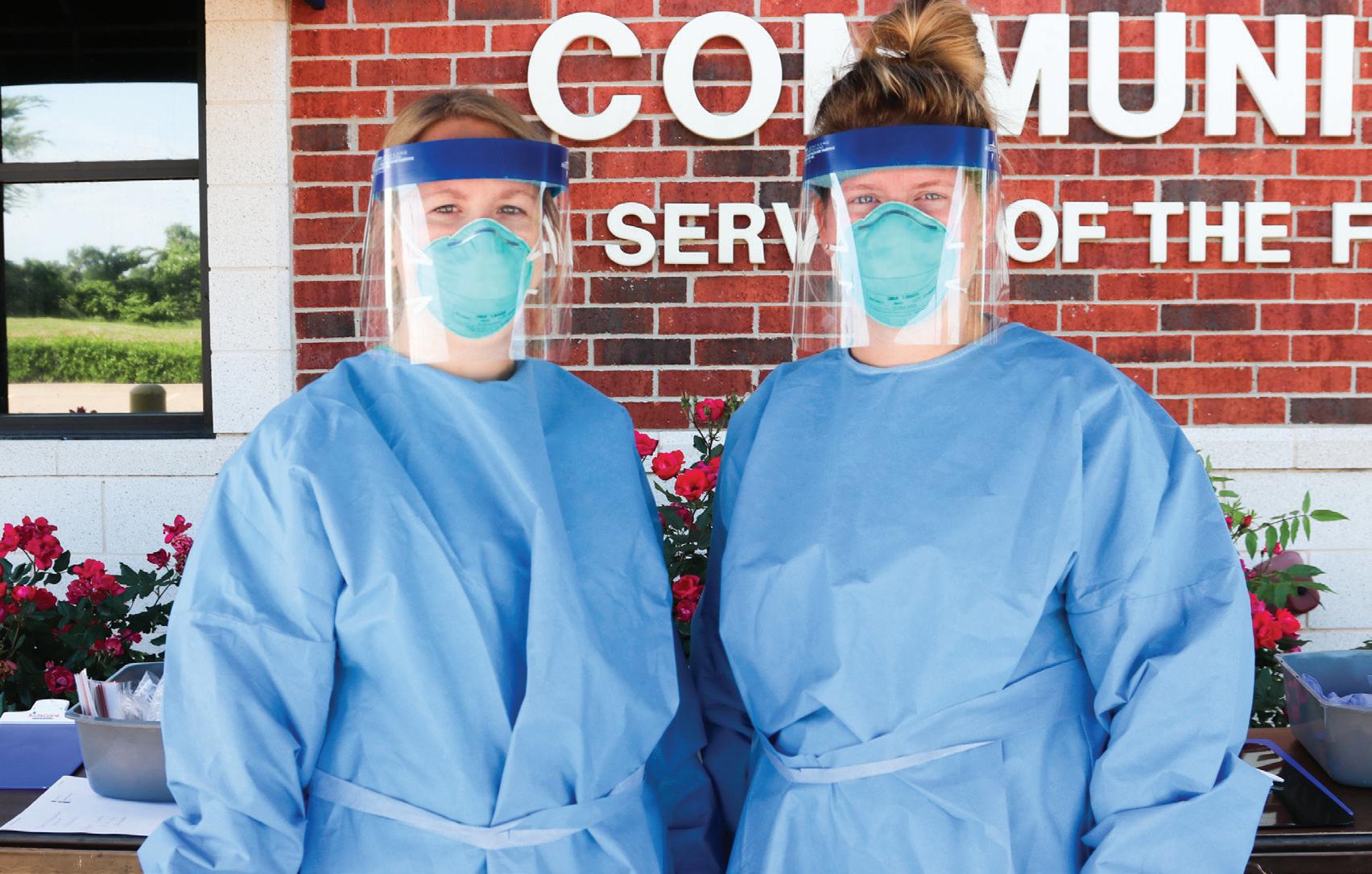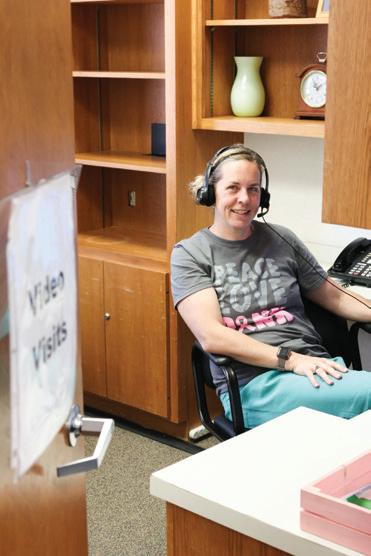
15 minute read
Waco Family Medicine is Working to Drive Solutions
by Jackson Griggs, MD, FAAFP, Chief Executive Officer, Waco Family Medicine
Robust population health data makes it clear: a strong primary care foundation offers communities lower-cost, higher-quality healthcare with fewer population health disparities. Access to a regular primary care physician is associated with better prevention, fewer hospitalizations, fewer unnecessary emergency department visits, and less need for specialist services. During a period of time in our community when efforts are mounting to reduce unnecessary emergency department use, increase health equity, and decrease the overall cost of healthcare, Waco Family Medicine is committed to the day-to-day work of driving solutions.
Waco Family Medicine (WFM), known until recently as Family Health Center, has a mission of increasing access to and availability of high-quality, comprehensive primary and preventative healthcare for the vulnerable in the Heart of Texas; and providing an excellent educational, training, and research environment in the medical, dental, and behavioral health fields. The organization has served the residents of McLennan County for 51 years, officially starting in July of 1970 in the basement of Waco’s Providence Hospital when it was located at the intersection of 18th Street and Colcord Avenue.
The originating concept for the organization started in the late 1960s, when the McLennan County Medical Society established the center to address the related problems of a shortage of physicians, a lack of access to primary care for low-income residents, and economic development issues. Specifically, emergency services were inadequate, hospitals were financially strained with a substantial burden of uncompensated care, and the population in poverty was severely underserved. Additionally, local leaders knew that the physician population was small and advanced in years, and the community needed to attract young physicians to the area.

Each year, more than 800 applicants vie for just 12 new spots in the Waco Family Medicine Residency Program.
Photos provided by Waco Family Medicine / Rae Jefferson & Selena Cortez
With support from a coalition of medical, business, and political leaders, the Waco Family Practice Residency Program was envisioned in 1969 to train recent medical school graduates in the newly minted specialty of Family Practice. As the first Family Practice Residency west of the Mississippi, the founding class of two physicians completed their training in 1972. The program has grown in number and prestige ever since. Over 440 physicians have completed their residency training in Waco, and more than half of the family medicine doctors practicing in the Greater Waco area received their training at WFM.
Waco Family Medicine now welcomes 12 physicians each year for a three-year residency. With more than 800 annual applicants to choose from, WFM is fortunate to select the brightest and most committed aspiring family doctors. 2020 graduates boasted board scores in the 90th percent nationally, with 100% of residents passing their board exams for the ninth year in a row! And, consistent with the emphasis on compassionate care for the vulnerable, 46% of our residency graduates practice in Health Professional Shortage Areas, the highest of any Family Medicine residency program in Texas. It’s no surprise, then, that the Waco Family Medicine Residency Program is ranked in the top 2% in the nation by Doximity.
The Residency Program’s physicians provide coordination and continuity across multiple settings: caring for patients in primary care clinics, following them as patients in both of our local hospitals, providing prenatal care and newborn deliveries (more than 1,300 last year), and offering care in several local nursing homes. The services they provide cover the entire lifespan, and they often provide care to multiple generations of the same family.
Beyond the residency program, Waco Family Medicine also offers board-certified fellowships in Hospice & Palliative Care Medicine, Sports Medicine, and Applied Clinical Informatics – all of which strengthen the quality and scope of care available for our patients and community.
Waco Family Medicine Serves the Underserved

In the midst of COVID-19, Waco Family Medicine clinics continue to treat patients for non-COVID illnesses. Staff members screen patients for COVID symptoms before entry, redirecting patients to outdoor clinics as needed.
Photos provided by Waco Family Medicine / Rae Jefferson & Selena Cortez
Waco Family Medicine extends beyond the residency training program and affiliated fellowships. In 1999, WFM was approved as a Federally Qualified Heath Center (FQHC) by the Health Resources and Services Administration (HRSA). Definitionally, an FQHC strives to meet the needs of an underserved population by providing comprehensive primary care services. In so doing, it also offers opportunities for employment and contributes to community health initiatives. FQHCs work to empower underserved areas with high-quality patient care, yielding a healthier workforce, fewer health disparities, and better solutions to underpinning issues contributing to poverty. Across our nation, 1 in 11 people rely on a HRSA-supported Health Center for affordable, accessible primary healthcare.
To qualify as an FQHC, an organization must continually: serve an underserved area or population; deliver holistic and comprehensive health and social services; provide care on a sliding fee scale based on ability to pay; operate under a governing board where patients serve as a majority of members; complete annual reporting requirements; and engage in ongoing quality improvement
In return for meeting these requirements, FQHCs qualify for certain enhancements in Medicaid and Medicare reimbursement. As nonprofit, tax-exempt organizations, FQHCs are eligible to receive additional grants from the government and the public sector, support from corporate entities, and donations from private individuals.
At the time of its designation as an FQHC, Waco Family Medicine (then Family Practice Center) was seeing around 15,000 patients per year. The subsequent years it exhibited tremendous growth as the community’s key source of primary care for individuals receiving Medicaid/Medicare benefits or for those without insurance. Now, with currently close to 60,000 patients, the center provides care at 14 clinical sites throughout McLennan County—including Bellmead, West Waco, and McGregor—and at one site in Bell County. Last year alone, Waco Family Medicine conducted almost 250,000 clinical visits, helping 1 in 5 residents of Waco and 1 in 4 residents of McLennan County.
Among the services offered, Waco Family Medicine provides dental care at four sites, behavioral health at seven sites (and growing), and maternity care at nine sites. Waco Family Medicine has a full-service pharmacy offering deeply discounted prices to patients, a laboratory providing the full array of common tests, and broad radiology services. Clinical staff include family physicians, internists, obstetriciangynecologists, pediatricians, nurse practitioners, physician assistants, dentists, dental hygienists, clinical social workers, and a clinical psychologist.
In spite of the fact that the vast majority of WFM patients do not have commercial insurance, 78% of revenues originate from patient care sources— principally Medicaid, Medicare, CHIP, and sliding scale fees. With programs like the Good Health Card, those who do not have insurance can qualify to pay reduced rates on a sliding scale based on their income. The enhanced rates WFM receives for Medicaid under the FQHC designation help cover the costs of patients with limited means to pay. Indeed, every WFM clinician takes Medicaid; and Medicaid patient care supports WFM services in a critical way.
The Waco/McLennan County poverty rate exceeds that of Texas, and the poverty rate of Texas exceeds the national average. Similarly, Texas has the highest uninsured population in the country. Locally, that translates into many community members falling into the gap where health insurance is unaffordable—and because of the nature of their work, they do not receive employee-sponsored health insurance coverage. This population, often referred to as the “working poor,” typically receive primary care, dental services and mental health care at Waco Family Medicine. This fits the core WFM objective: the organization is dedicated to serving all people, regardless of ability to pay.
Waco Family Medicine Provides Access to Primary Care
The values of primary care to health and healthcare are widely described and undeniable. Indeed, for every dollar spent in primary care, thirteen other healthcare dollars are saved—while population health outcomes improve. Nevertheless, in the United States we continue to underinvest in primary care. Of the $3.8 trillion spent each year on healthcare in America (just over $11,000 per person per year), only 6% of healthcare dollars are spent on primary care. If this disproportionate underinvestment in primary care were corrected nationally, United States health outcomes would be more in line with other developed countries.
The underinvestment in primary care is evident among populations with longstanding conditions: chronic disease is optimally managed within primary care, but lack of access (especially due to underinsurance, unavailability, and cost) means too many people forego chronic disease management within primary care. This in turn leads to health deterioration, and vastly more expensive care within hospital settings. Moving upstream from hospital management of chronic disease to primary care management of chronic disease is less costly, safer, and more satisfying to those struggling with these conditions.
While chronic care management is essential, prevention of chronic conditions provides massive returns on investment. Health-harming habits and behaviors that lead to chronic disease are consistently recognized and addressed in primary care visits. Indeed, behavior-change techniques are elemental in primary care training and practice. Coupling chronic disease care with behavioral intervention that prevents chronic disease, primary care increases the value of healthcare when it is situated in the foreground of systems of health.
Beyond chronic conditions and health behaviors, nearly half of Americans will have a diagnosable mental disorder in their lifetime; one in four people will have a diagnosable mental disorder in any given year. Mental disorders occur at higher rates among socioeconomically vulnerable populations who experience frequent traumatic stress and lack coping resources. Indeed, in safety net centers such as Waco Family Medicine, over 60% of adult patients passing through clinic doors may be experiencing a diagnosable mental health condition.
Contrary to common misconceptions, the majority of mental illness in the United States is treated in primary care settings. Primary care is not only the most convenient setting for treating common mental disorders, it is also the only setting where most patients needing medications can receive that care. This is particularly true in Texas, which ranks 49 out of 50 states on the availability of mental health experts.
America’s health needs are daunting. Yet because primary care leans into the complexities of biological, psychological, and social health, it stands ready to meet those needs. Correcting a national underinvestment in primary care will yield steady gains. Locally, strategic investment in Waco Family Medicine augments population health and flourishing, improves health outcome equity, reduces healthcare cost, and supports a strong workforce. Strengthening primary care for those on the socioeconomic margins yields sizable benefits throughout the community.
Waco Family Medicine Services
Waco Family Medicine provides an array of services that set it apart as a leading FQHC in the United States. The Waco Family Medicine Residency Program draws from top-performing primary care applicants from medical schools across the country. The Waco program selects resident physicians from this exceptional talent pool based on character, compassion and integrity. After training aggressively for three years at the Waco program, many graduates work for WFM or stay in Central Texas, contributing richly to the local healthcare ecosystem. The quality of Waco Family Medicine clinicians is unparalleled.
WFM has a full-scale pharmacy to fill prescriptions for patients. HRSA grant funding allows the WFM pharmacy to provide critical medicines to patients at greatly reduced rates. During the COVID-19 pandemic, WFM’s pharmacy inaugurated a home delivery prescription program for patients with transportation limitations and other needs.
Waco Family Medicine’s laboratory processes 90% of needed lab tests for WFM patients—allowing for faster turnaround and smaller out-of-pocket costs for patients. In-house radiology offers standard plain films for common images of chest, abdomen and bones. In addition, it offers high-resolution ultrasound imaging, bone-density evaluation, and CT scanning.
Behavioral health services are fully integrated into primary care at Waco Family Medicine. Integrated Health Managers, all licensed clinical social workers, work alongside medical clinicians to support the mental and behavioral health needs of patients. Embedding behavioral health expertise within primary care teams avoids delays between problem identification and treatment. It also precludes inequities seen when primary care and traditional mental health services are disjointed. Beyond integrated services, WFM counseling is available to patients needing traditional, in-depth psychotherapy in offices separate from the busy medical environment.

Senator John Cornyn visited with Dr. Jackson Griggs, community partners, and the local media at one of Waco Family Medicine’s COVID clinics on Aug. 19, 2020. Senator Cornyn advocated for organizations like WFM to receive funds from the CARES act to help keep underserved community members healthy during the pandemic.
Photos provided by Waco Family Medicine / Rae Jefferson & Selena Cortez
Medication assisted therapy for individuals who struggle with opioid dependence is offered at multiple sites within WFM. Using multiple modalities, clinicians treating opioid use disorder address a longer standing and more hidden epidemic in our community.
Chronic Care Management is another innovative WFM program that introduces a dedicated care manager to the care team for aging adults with multiple chronic illnesses. The care manager offers specialized attention between appointments to help coordinate care and address the unique environmental factors influencing a patient’s physical and mental health.
To optimize maternal and child health outcomes, WFM provides a population-focused set of Programs for Women and Children. The department’s primary objective is to achieve generational health equity through evidence-based initiatives—such as comprehensive breastfeeding support services, group prenatal care, and the adoption of a youth-friendly approach to adolescent wellness. Barriers to accessing healthcare are continually identified and addressed in order to reposition women at the center of their health interests.
One of the newest innovations at WFM is a program offering prescriptions for exercise and fresh produce. Lifestyle coaching for chronic conditions (such as high blood pressure, obesity, diabetes or coronary heart disease), can be augmented through produce prescriptions for patients who are not in the habit of consuming fresh vegetables. These prescriptions can be filled at several of our clinic sites during harvest seasons multiple times a year. Medical staff can also write prescriptions for exercise, giving patients access to the WFM Wellness Center at the Madison Cooper Community Clinic. At the Wellness Center, patients are paired with a fitness advisor who helps create a tailored exercise plan and establishes constantly evolving goals for each patient. Patients enrolled in these programs report improvements consistent with expectations: weight, blood pressure reduction, diabetic outcome improvements, chronic pain reduction and mood improvement.
Health-harming legal needs are important social determinants of health impacting many WFM patients. Custody issues, property disputes, tenancy problems, citizenship quandaries, and a variety of other dilemmas impact health and patient wellbeing. To address these needs, WFM has teamed up with Greater Waco Legal Services to form a Medical-Legal Partnership. Patients experiencing health-harming issues can be referred for legal counsel at reduced rates and can often be provided the assistance they need within our clinic.
A longstanding collaborator contributing to the healthcare workforce in Central Texas is Texas Area Health Education Center (AHEC) East – Waco Region. A statewide program hosted locally by WFM, AHEC focuses on three essential services: preparation of students intending to enter the health professions; clinical placements for medical students and others; and ongoing education for practitioners in the field. AHEC’s ultimate objectives include attracting and training healthcare providers to work in our region and eliminating the health disparities affecting many medically underserved communities in our state.
Waco Family Medicine’s Response to COVID-19

Waco Family Medicine’s COVID-19 outdoor clinics have been critical to addressing the pandemic in McLennan County’s backyard.
Photos provided by Waco Family Medicine / Rae Jefferson & Selena Cortez
The novel coronavirus pandemic has created extensive and unexpected challenges for Waco Family Medicine. As the pandemic emerged last year, WFM identified four key goals: prevent unnecessary emergency department use through adequate coronavirus testing for WFM patients; accurately diagnose and manage mild to moderate COVID-19 and educate infected patients and close contacts on preventing further spread; avoid viral transmission within clinical sites; and contribute to accurate, timely public health education within the community.
Early efforts were focused on setting up outdoor tent and drive-up clinics for testing, securing adequate PPE for staff, building IT infrastructure and workflows for telehealth, and developing extensive protocols for patient and staff protection.
For public education, WMF offered two-minute, healthliteracy appropriate educational videos in English and Spanish disseminated through social media. Facebook Live events answered the public’s questions in English and Spanish, and an array of other social media education was provided on a host of COVID-specific topics.
At the writing of this article in mid-winter, using accurate point-of-care testing, Waco Family Medicine is diagnosing over 200 patients a week with COVID-19, offering each patient education on isolation and quarantine for close contacts. In addition, through the pandemic, WFM has responded in a myriad of ways: hosting COVID-related race-equity conversations with local leaders and advocates; contributing routinely to press conferences to inform and educate the public; contributing to alternate care site strategic planning; and collaborating with Baylor University research on prevalence among at-risk populations.
With 570 employees, Waco Family Medicine did not qualify for loan assistance through the Paycheck Protection Program but was able to retain its full workforce without terminations or furloughs – despite significant revenue loss due to reduced patient visits. Grant funding, philanthropy, diligent clinical work and innovation stabilized the organization sufficiently to endure the pandemic.
Going forward, FQHCs in Texas need strengthening to create resilience, improve preventative services, decrease community health care costs otherwise shifted to employers, and enhance population health. Key to this effort is increasing the number of Texans in poverty receiving Medicaid and commensurately decreasing the population who remain uninsured. Paths forward that avoid burdening the Texas budget but capture federal funding will improve human and economic wellbeing.

Medical providers have adapted to COVID-safe methods of providing patient care, including curbside visits and Telehealth visits, which connect patient and provider over video or phone calls.
Photos provided by Waco Family Medicine / Rae Jefferson & Selena Cortez

Medical providers have adapted to COVID-safe methods of providing patient care, including curbside visits and Telehealth visits, which connect patient and provider over video or phone calls.
Photos provided by Waco Family Medicine / Rae Jefferson & Selena Cortez
Waco Family Medicine’s Supporters
Waco Family Medicine relies on faithful, ongoing community collaboration and partnership. Key to WFM’s success are City of Waco and McLennan County, Baylor Scott & White Hillcrest, Ascension Providence and local foundations. Cooper Foundation, Waco Foundation, and the Bernard & Audre Rapoport Foundation are treasured, long-time supporters of WFM who provide support in a multitude of ways.
Generous individual supporters are another devoted, consistent, and meaningful source of support for Waco Family Medicine. Donors contribute to the Waco Family Medicine Foundation established almost 30 years ago to support the mission of the Center and Residency. Over the decades, thousands of individual donors have contributed millions of dollars to help ensure that quality of care remains high and education excellent.
Looking to the Future
Pandemic and economic uncertainties make futurecasting difficult. Pandemic recovery will bring new tasks and FQHC funding will remain heavily reliant on the successful functioning of federal and state governments and agencies. Staff who have shown heroic efforts during the pandemic need time to heal from the emotional costs of the work. As the community grows, so does the population in need, and it is the nature of healthcare to continuously expand in complexity.
But moving forward, Waco Family Medicine remains fiercely committed to its mission to serve the community. WFM aims to be known for providing evidence-based interventions to support the health of individuals, families, and the community – in an organizational culture that values compassion, respect, and equity – and in a manner that supports financial stability and sustainability. The recent branding change – from Family Health Center to Waco Family Medicine cements WFM’s commitment to this community and its health. For 51 years and enduring into the future, Waco Family Medicine will be from this community, for this community and by this community.



